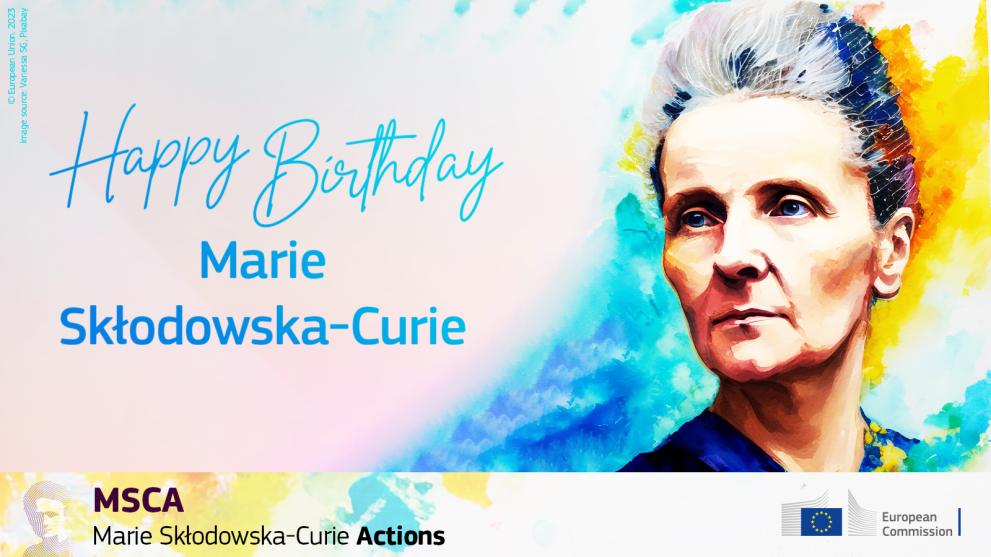
On November 7, the world celebrates the 156th birthday anniversary of Marie Skłodowska-Curie, a scientific luminary whose ground-breaking contributions forever altered the course of science. Her remarkable life and pioneering work in radioactivity and nuclear physics have left an indelible mark on the scientific community. Marie Skłodowska-Curie remains the only female scientist in the world to have been awarded two Nobel Prizes, a testament to her exceptional journey and unwavering commitment to scientific exploration.
The Enduring Legacy
Marie Salomea Skłodowska, born on 7 November 1867 in Warsaw, Poland, defied the socio-political barriers of her time, exemplifying determination and an unyielding pursuit of knowledge. In 1903, she received her first Nobel Prize in Physics, shared with her husband, Pierre Curie, and Henri Becquerel, for their revolutionary research on radioactivity. This work laid the foundation for our understanding of atomic structures and advanced the field of nuclear physics.
In 1911, Marie Skłodowska-Curie achieved another historical milestone by becoming the first person ever to receive a Nobel Prize in two different scientific fields. Her second Nobel Prize, in Chemistry, recognised her revolutionary research on the elements radium and polonium. Beyond expanding our knowledge of fundamental matter, her discoveries had profound implications for medicine, leading to the development of radiation therapy and the saving of countless lives.
The MSCA Programme: Nurturing Scientific Excellence
As we celebrate Marie Skłodowska-Curie's birthday, we pay homage to not only to her ground-breaking work but also the lasting impact of the Marie Skłodowska-Curie Actions (MSCA).
Over the last 27 years, the MSCA programme adapted to the evolving needs of the scientific community and reached out on the global stage. While the concept of researcher mobility was initially introduced in the early framework programmes of the European Commission, it truly took shape in the 4th Framework Programme (1994-98), marked by the branding of Marie Curie Fellowships in 1996. In 2014, a significant milestone was achieved under Horizon 2020 when the programme underwent a 'rebranding' to bear the name of Marie Skłodowska-Curie.
With a budget of €6.6 billion under Horizon Europe, the MSCA programme supports researchers. They also foster excellence in research and innovation collaborations, knowledge transfer, methodologies and content, as well as in training, supervision and career guidance. They benefit institutions by supporting excellent doctoral, postdoctoral programmes and collaborative research and innovation projects. This helps boost institutions’ global attractiveness and visibility, and fosters cooperation beyond academia, including with large companies and SMEs.
The MSCA are open to all domains of research and innovation and encourage international cooperation to set-up strategic collaborations. Between 1996 and 2027, over 200.000 researchers will have participated in the MSCA, of which 64,000 will be PhD candidates. Since 2014, nearly 9,000 organisations from over 130 countries have been involved in the programme. It has also funded 1,180 international doctoral programmes.
“Excellence, Training, Mobility”
The core objectives of the MSCA programme are to establish connections between the European Education Area (EEA) and the European Research Area (ERA) by focusing on skill development, training and career development in doctoral education and research. It is a key driver for nurturing excellence in European research and innovation (R&I), transcending academic boundaries and disciplines.
This strategic approach involves seamlessly linking education and research, with a strong emphasis on fostering excellence through doctoral education and postdoctoral training. The MSCA Doctoral Networks aim to train creative and resilient doctoral candidates, who are able to face current and future challenges, and to convert knowledge and ideas into products and services for economic and social benefit. The goal of the MSCA Postdoctoral Fellowships is to enhance the creative and innovative potential of researchers holding a PhD, wishing to acquire new skills through advanced training, international, intersectoral and interdisciplinary mobility.
The MSCA programme also co-finances regional, national and international doctoral and postdoctoral programmes via the MSCA COFUND action, promoting high standards and excellent working and employment conditions. They also promote staff exchanges through the MSCA Staff Exchanges action, allowing academic and non-academic organisations all over the world to cooperate, transfer knowledge and turn ideas into innovative products, services and processes. This has further boosted ties between academia and industry, involving nearly 6,000 companies and more than 3,100 SMEs since 2014.
MSCA and the 2023 Nobel Laureates for Physics: A Remarkable Connection
The MSCA programme has left an indelible mark on the scientific community, with an impressive count of 18 Nobel Prize-winning laureates among its fellows, coordinators and supervisors. Of these remarkable individuals, two laureates were celebrated in 2023.
The Nobel Prize in Physics 2023 was awarded to Anne L’Huillier and Ferenc Krausz, both of whom have been funded and supported by the MSCA programme as former coordinators and supervisors, for “experimental methods that generate attosecond pulses of light for the study of electron dynamics in matter”.
Many MSCA researchers have had the chance to work alongside L’Huillier and Krausz and under their direct supervision.
Dr L’Huillier has supervised MSCA postdoctoral researchers and coordinated several MSCA projects over the past two decades, including ATTOPIE, OHIO and ATTOCO. Recently, she also obtained funding for the MSCA doctoral training network MEDEA, training and supervising doctoral researchers.
Dr Krausz has supervised MSCA postdoctoral researchers and coordinated several MSCA projects over the past two decades, including NICOS, ALPINE and ATTOTRON.
Both L’Huillier and Krausz obtained funding and cooperated through the MSCA doctoral training network ATTOFEL, and trained and supervised a number of doctoral researchers.
More information:
Factsheet MSCA: Almost 30 years of European support to researchers
Factsheet MSCA: Developing Talents, Advancing Research
Details
- Publication date
- 7 November 2023
- Author
- European Research Executive Agency
